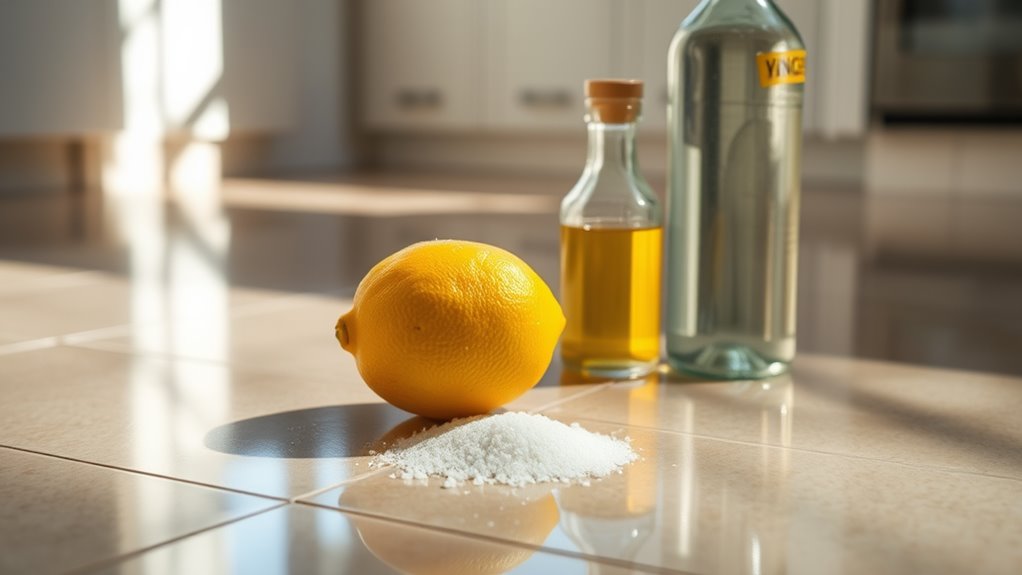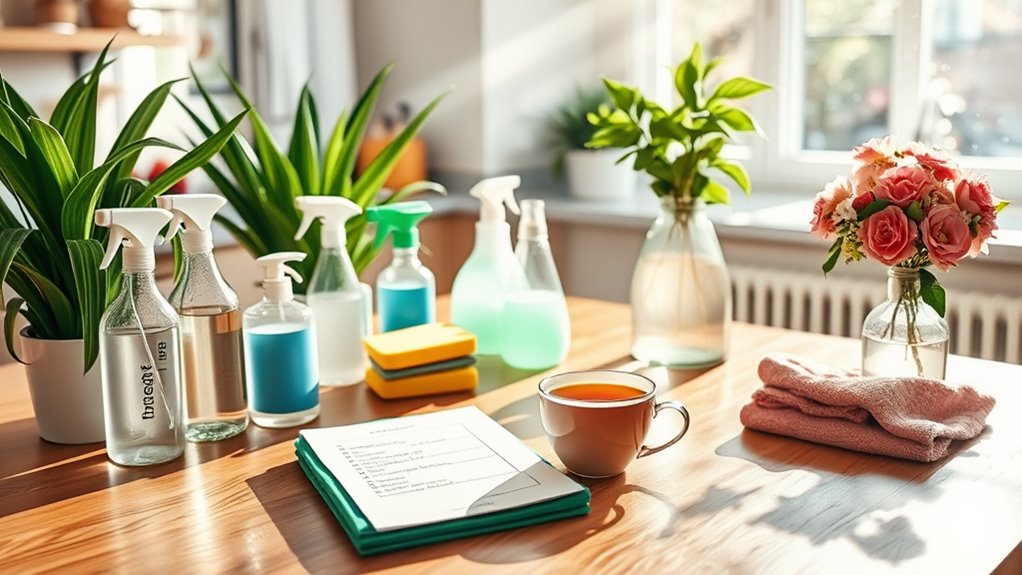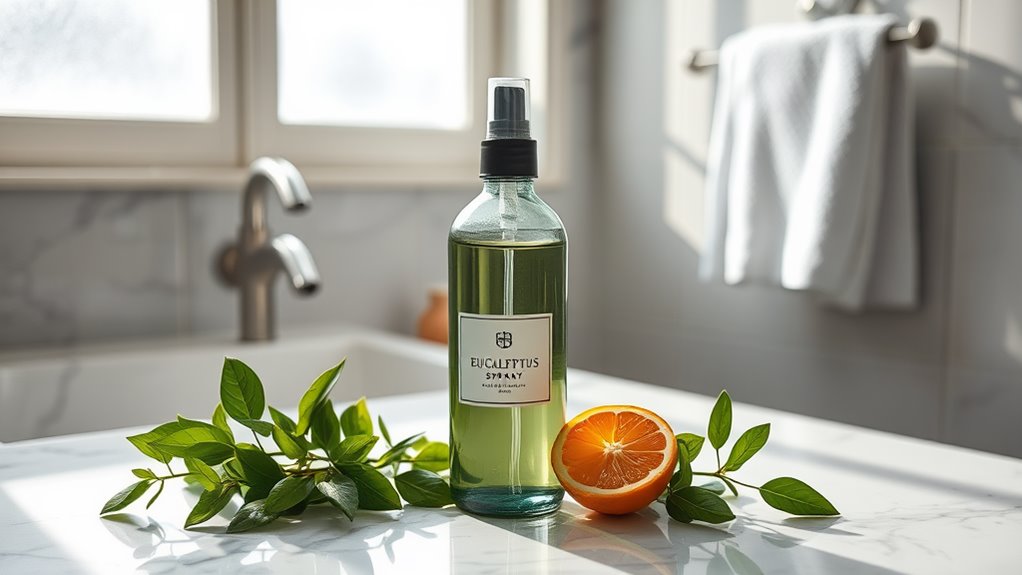The 3 Natural Ingredients I Use for a Sparkling Kitchen Floor
To get a sparkling kitchen floor, you’ll need three natural ingredients: vinegar, lemon juice, and baking soda. Mix equal parts vinegar and water for a powerful all-purpose cleaner. Use lemon juice to cut through grease and sanitize surfaces. For stubborn stains, make a paste with baking soda and scrub gently. These ingredients not only clean effectively but also promote a healthier home. Discover more tips for maintaining that shine and freshness throughout your kitchen!
Key Takeaways
- Vinegar: Mix equal parts vinegar and water for an effective all-purpose cleaner that breaks down grime and grease on kitchen floors.
- Lemon Juice: Combine lemon juice with water to create a natural degreaser that sanitizes surfaces and cuts through tough grease.
- Baking Soda: Use baking soda as a gentle abrasive to scrub stubborn stains without scratching, while also neutralizing odors.
- Combination Power: For enhanced cleaning, mix vinegar and baking soda to create an effervescent solution for tough stains and grime.
- Eco-Friendly Benefits: These natural ingredients reduce harmful chemicals in your home, promoting a healthier and safer cleaning environment.
Vinegar: The All-Purpose Cleaner
When you’re looking for an effective and natural way to clean your kitchen floor, vinegar stands out as an all-purpose cleaner. Its acidic properties break down grime and grease, making it perfect for tough stains. Simply mix equal parts vinegar and water in a spray bottle, then apply it to your floor. As you wipe, you’ll notice how effortlessly dirt lifts away. For a natural floor shine, consider adding a few drops of essential oil for a pleasant scent. This method not only cleans but also leaves your kitchen feeling fresh. Additionally, vinegar can be combined with baking soda for even tougher cleaning tasks, creating a powerful reaction that tackles stubborn grime. This combination results in a foamy reaction that helps lift away dirt and debris from surfaces. Plus, vinegar’s antibacterial properties guarantee your space remains hygienic. Using vinegar as a cleaner can help reduce harmful chemical exposure in your home, promoting a healthier living environment. Furthermore, vinegar is recognized for its natural sanitizing properties, making it an excellent choice for maintaining a clean kitchen. Additionally, vinegar is an excellent choice for natural cleaning solutions due to its effectiveness and eco-friendliness. Embrace this simple yet powerful solution, and you’ll achieve that sparkling clean kitchen floor you desire.
Lemon Juice: The Natural Degreaser
If you want a natural degreaser that packs a punch, search no more than lemon juice. Its acidity cuts through grease effortlessly, making it a powerful ally in your kitchen cleaning arsenal. Just mix lemon juice with water, and you’re ready to tackle even the toughest spots. Additionally, lemon juice can also help sanitize kitchen surfaces effectively, ensuring a clean and safe environment for food preparation. This wonderful ingredient works particularly well when combined with vinegar and baking soda, enhancing its cleaning power. Moreover, using lemon juice as a cleaner promotes eco-friendly practices, reducing the need for harsh chemicals. Lemon juice is also known for its ability to remove stubborn stains, making it an essential tool for maintaining a pristine kitchen. Furthermore, it can be used as part of a DIY cleaning spray to further streamline your cleaning routine.
| Benefits | How to Use | Tips |
|---|---|---|
| Powerful Degreaser | Mix 1 cup lemon juice with 1 cup water | Use a spray bottle for easy application |
| Natural Antimicrobial | Apply directly to greasy surfaces | Let it sit for 5-10 minutes for best results |
| Fresh Scent | Wipe with a microfiber cloth | Rinse with water after cleaning |
Embrace lemon juice for a sparkling kitchen floor that shines with natural brilliance!
Baking Soda: The Gentle Abrasive
Baking soda is also effective for unclogging drains when combined with vinegar, making it a versatile tool in your natural cleaning arsenal. Although it may seem gentle, baking soda is a powerful abrasive that can effectively tackle stubborn stains on your kitchen floor. Its fine granules provide just the right amount of scrubbing action without scratching delicate surfaces. Additionally, regular use of baking soda can help prevent water spots from forming on your kitchen floor. Using it as part of a natural cleaning routine can enhance overall cleanliness and promote a healthier environment free from harsh chemicals. Baking soda can also neutralize odors, making it a great choice for maintaining a fresh kitchen atmosphere.
To harness baking soda’s cleaning prowess, follow these tips:
- Mix it with water to create a paste for targeted stain removal.
- Sprinkle it on tough spots and let it sit to break down grime.
- Combine it with vinegar for an effervescent cleaning boost.
- Use it as a natural deodorizer to keep your kitchen fresh.
- Rinse thoroughly after cleaning to guarantee no residue remains.
With baking soda in your cleaning arsenal, you’ll achieve a sparkling kitchen floor that reflects your mastery of natural cleaning techniques.
Frequently Asked Questions
Can I Mix These Ingredients for Better Cleaning Results?
You can mix certain ingredients for improved cleaning results, but be cautious. Some combinations might react negatively. Experiment with small amounts first, and always test on a hidden area to guarantee safety and effectiveness.
Are These Ingredients Safe for All Types of Flooring?
You’ll find these ingredients safe for many flooring types, but always test a small area first. Different materials react differently, so make certain you’re protecting your floor while achieving that sparkling clean you desire.
How Often Should I Clean My Kitchen Floor With These?
You should clean your kitchen floor at least once a week, but if you cook frequently or have pets, consider doing it more often. Regular maintenance keeps your floor looking great and prevents dirt buildup.
What’S the Best Way to Store Leftover Mixtures?
To store leftover mixtures, pour them into airtight containers, label them with the date, and keep them in a cool, dark place. This way, you’ll maintain their freshness and maximize their usage for future cleaning.
Are There Any Allergens in These Natural Ingredients?
When considering natural ingredients, always check for potential allergens. Common ones include citrus and certain oils. You’ll want to guarantee you’re not sensitive to any components before using them in your cleaning routine.



